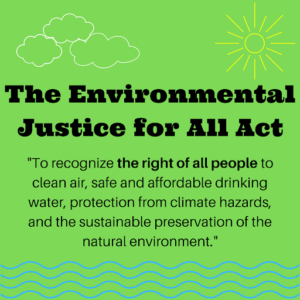On July 27, the U.S. House Natural Resources Committee approved H.R.2021, the Environmental Justice (EJ) for All Act. The bill is currently sitting before the U.S. House of Representatives for a vote. This landmark piece of legislation would enshrine important protections for minority and low-income communities disproportionately affected by pollution and environmental degradation. It has been co-sponsored by 103 representatives and applauded by 175 EJ and civil rights groups. So what does the bill do?
1. The EJ for All Act would amend four major pieces of legislation to better protect EJ communities from harm
First, it would clarify the definition of ‘discrimination’ in the 1964 Civil Rights Act. The new definition prohibits any “program, policy, practice, or activity that causes a disparate impact on the basis of race, color, or national origin.” It also allows victims of discrimination to file suit against an entity for damages.
Second, the EJ for All Act would amend the Clean Air Act and the Clean Water Act. In both, the bill would require evaluating cumulative impacts, or the “combined past, present, and reasonably foreseeable emissions and discharges” in an area, when considering new emission or discharge allowances. Permits may be denied if they cannot ensure that the added pollution would result in “no harm to health of the general population” in a region with significant historical pollution.
Lastly, the act would add EJ requirements to the National Environmental Policy Act (NEPA). NEPA requires federal agencies to consider the environmental impacts of a broad range of actions. Under the new EJ requirements, consideration of cumulative impacts of pollution would become required. It would also require more transparent and accessible public participation during the review process, allowing for more significant input by marginalized communities about activities that impact their health.
2. At the executive level, the EJ for All Act would add a new executive office and advisory board with the goal of issuing a comprehensive EJ strategy across all federal agencies
The act establishes a new White House Environmental Justice Interagency Council, which would develop a federal EJ strategy with measurable goals and coordinate with relevant federal agencies to assess and improve their EJ strategies. At the same time, the National Environmental Justice Advisory Board would be created to specifically guide the Environmental Protection Agency’s EJ efforts. This panel of representatives from state, local, and Tribal governments, grassroots community groups, and the private sector would oversee the EPA’s creation of an EJ framework and review its policies for improvements.
3. The EJ for All Act invests hundreds of millions of dollars of funding into projects benefiting EJ communities
These programs include:
- Federal Energy Transition Economic Development Assistance Fund: Funding for fossil fuel-dependent states to develop job-training programs prioritizing fossil fuel workers, provide financial assistance to residents, and create infrastructure and restoration projects that will provide jobs and diversify local economies. Revenue for this program will be raised via a fee on coal, oil, and gas leases.
- EJ Grant Program: $75 million per year for various national, state, Tribal, and community grants for projects to identify, address, and educate about public health issues in EJ communities
- EJ Basic Training Program: $10 million per year for a training program to connect residents with environmental groups and resources that will help them identify and address disproportionate public health and environmental effects in their communities
- Grants for acquiring and renovating land to be used to increase access to parks for underserved urban and suburban communities
- Research grants for safer cosmetic, cleaning, and consumer products in communities of color
CCJ is a member of the Alliance for Appalachia, which is hosting an Environmental Justice Workshop Thursday, August 18, at 6 p.m. on Zoom. This webinar will provide more information about environmental justice in Appalachia and dig into the details of this bill and the many ways it can benefit the region. Register for the event here.


